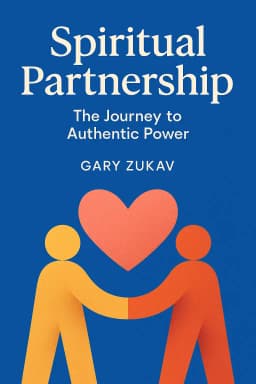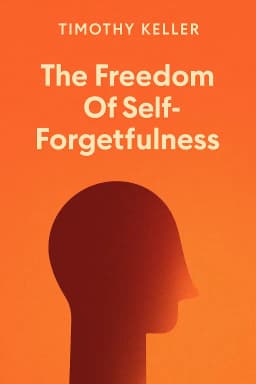
The War on Worry
Golden Hook & Introduction
SECTION
Daniel: A recent study found that 85% of what people worry about never actually happens. So, if our anxieties are mostly fiction, why does it feel like we're living in a non-stop disaster movie? And what if the secret to stopping it isn't positive thinking, but something more like... spiritual warfare? Sophia: Spiritual warfare? That sounds intense. I was expecting something more like… scented candles and deep breaths. That’s a pretty dramatic leap from ‘don’t worry, be happy.’ Daniel: Exactly! And that's the surprising edge in Joyce Meyer's book, Be Anxious for Nothing. Meyer herself is a fascinating figure. She built a global ministry after overcoming severe childhood abuse, which gives her perspective a raw, real-world grit that you don't always find in the self-help aisle. Sophia: I see. So this isn't coming from someone who’s had a perfect, placid life. That context is important. It’s one thing to preach peace from a palace, another to find it after a fight. Daniel: Precisely. And she argues that worry is more than just a bad habit; it's a thief. The writer Corrie Ten Boom put it perfectly, a quote Meyer uses: "Worrying is carrying tomorrow’s load with today’s strength—carrying two days at once." Sophia: Wow. That’s a heavy thought. It’s like you’re paying interest on a debt you might not even owe. So where does Meyer begin to unpack this? How do we stop carrying two days at once?
The Futility of Worry & The Power of Perspective
SECTION
Daniel: She starts with a simple, almost blunt, diagnosis: worry is a waste of time. It’s ineffective. It doesn't solve problems; it just steals your peace and joy in the present moment. The French philosopher Michel de Montaigne famously said, "My life has been filled with terrible misfortune; most of which never happened." Meyer argues that’s the default state for most of us. Sophia: That is painfully relatable. I can spend an entire afternoon mentally rehearsing a difficult conversation that never even takes place. It's exhausting. But does she offer more than just pointing out how irrational we are? Daniel: She does, and she uses her own life as the primary case study. She tells this story about a period where everything in her house seemed to be breaking at once. The generator wasn't working, there was water damage in the walls from heavy rain, her husband Dave's golf cart battery died, and on top of all that, she found out she needed cataract surgery. Sophia: Oh, I know that feeling. It’s like the universe has a personal vendetta against your home appliances and your general well-being. Daniel: Right. And her initial reaction was to get overwhelmed, to start worrying about the cost, the hassle, the surgery. But then she had this moment of clarity where she realized that worrying wasn't fixing the generator, it wasn't drying the walls, and it certainly wasn't helping her eyes. It was just making her miserable. She had to consciously decide to take life one day at a time and trust that she would have the strength for each problem as it came, not all at once. Sophia: Okay, but those are, with all due respect to her generator, relatively minor inconveniences. What about real, life-altering fear? The kind of anxiety that feels completely justified because the stakes are so high? Daniel: That’s the critical next step. She addresses that head-on with a much more serious story from her past. About thirty years ago, she was diagnosed with a fast-growing form of breast cancer. The doctors recommended a mastectomy. Sophia: Whoa. Okay, that’s a different league of anxiety entirely. Daniel: Absolutely. And she describes being consumed by fear. Fear for her health, fear for her young and financially fragile ministry. She said one morning she was just overwhelmed, crying out to God. And she felt a clear instruction: stay positive and start verbally declaring positive statements based on scripture. For the ten days leading up to the surgery, every time fear crept in, she would force herself to remember times God had helped her in the past and speak those truths out loud. She said she could literally feel her emotions calming down as she did it. Sophia: That’s fascinating. It’s like she’s actively fighting her own brain chemistry. But this is also where some of the controversy around her comes in, isn't it? This idea of declaring things and expecting a certain outcome is tied to the "Word of Faith" movement, which critics often label as prosperity gospel. Daniel: You're right to bring that up. Meyer is a polarizing figure. Critics argue that this theology can oversimplify faith into a formula for health and wealth, which can be harmful when things don't turn out perfectly. And her story does have a "perfect" ending—the surgery was successful, the cancer hadn't spread, and her ministry received an unexpected check for $10,000 that covered all their expenses while she recovered. Sophia: Which, for a skeptic, might sound a little too neat. It could set up an expectation that if you just have enough faith, you'll get a miracle. What happens when you don't? Daniel: That's the core tension. Meyer's perspective, as presented in this book, is less about a transactional formula and more about managing your inner state. The point of her story isn't just that she was healed, but that she found a way to have peace before she knew the outcome. The principle she pulls from this is the first key to overcoming anxiety: Remember Past Victories. By recalling God's faithfulness in the past, you build the trust needed to face the present, regardless of the outcome. It’s about managing the fear, not just manipulating the future. Sophia: That’s a much more nuanced take. So the focus is on your internal response, not just the external result. It’s not about getting what you want, but about finding peace even when you don't know what you're going to get. Daniel: Exactly. It’s about breaking the cycle of "what if" and grounding yourself in "what has been." And that leads directly to the book's practical "how-to" guide for building that peace.
The 'How-To' of Peace: Prayer, Gratitude, and Discipline as Spiritual Warfare
SECTION
Daniel: And that fight against fear brings us to the book's core formula, which isn't passive at all. It's based on a single verse from the Bible, Philippians 4:6-7, and it reframes peace as something you actively seize. Sophia: Okay, lay it on me. What’s the magic formula? Daniel: It's surprisingly simple. The verse says: "Be anxious for nothing, but in everything by prayer and supplication, with thanksgiving, let your requests be made known to God; and the peace of God, which surpasses all understanding, will guard your hearts and minds." Sophia: Breaking that down, it sounds like: Don't worry. Pray about everything. Be thankful. And then you get peace. The first two parts are pretty standard religious advice. But that "with thanksgiving" part seems key. Daniel: It's the secret ingredient. Meyer argues that prayer without gratitude is just a cosmic complaint box. Gratitude is what shifts the entire dynamic. It opens the door for God to work, whereas complaining, she says, opens the door for the devil. Sophia: That’s a strong statement. So when you're in a toxic work meeting, instead of fuming, you're supposed to be mentally thanking God for... the free, stale coffee in the breakroom? How does this work in practice without feeling completely fake? Daniel: That's where the idea of discipline comes in. It's not about feeling thankful. It's about choosing to be thankful. It’s a discipline, a habit you build. And she frames it as a form of spiritual warfare. There's a wild story in the Old Testament, from 2 Chronicles, that she uses to illustrate this. King Jehoshaphat of Judah is about to be invaded by a massive, overwhelming alliance of armies. He's terrified. Sophia: Understandably so. I assume he didn't start by being thankful for the impending invasion. Daniel: Not at first. But after praying, he does something strategically insane. He appoints singers to march out in front of his army. And they aren't singing battle cries. They're singing, "Give thanks to the Lord, for his love endures forever." Sophia: He sent a choir to a sword fight? That’s either genius or the worst military strategy in history. Daniel: Well, the story goes that as they began to sing and praise, the enemy armies became confused and started attacking each other. By the time Jehoshaphat's army arrived, the battle was already over. They won without lifting a sword. Meyer's point is that gratitude wasn't just a nice feeling; it was an offensive weapon that confused the enemy and changed the reality of the situation. Sophia: Wow. Okay, framing it as a 'weapon' completely changes how I think about it. It’s not passive acceptance; it’s an active, strategic move. It’s like you’re refusing to play the enemy’s game of fear and despair. Daniel: Precisely. You’re changing the battlefield. And this requires discipline. It's not natural. Meyer talks about her husband, Dave, who has been lifting weights for over 60 years. He doesn't always feel like it, but he does it because he's disciplined. She argues that gratitude is the same. It's a muscle you have to choose to exercise, especially when you don't feel like it. Sophia: It reminds me of that old children's book, Pollyanna. She played the "Glad Game," where she had to find something to be glad about in every situation, no matter how bleak. It sounds childish, but maybe it’s a profound psychological hack. Daniel: It is! It's a conscious redirection of focus. You're training your brain to look for the good. And Meyer insists this has to be verbal. She quotes Proverbs 18:21: "Death and life are in the power of the tongue." Her argument is that when you speak your gratitude out loud, you're not just making yourself feel better; you're actively releasing power into the spiritual realm. Sophia: So, if a listener is feeling overwhelmed right now, what's the very first, simplest thing the book suggests they do? Not the whole formula, just step one. Daniel: Step one is to make a definite request. Don't just say, "God, help me." Pray specifically. Meyer tells a story about her recent eye problems. Instead of a vague prayer, she prayed specifically for God's "miracle-working power" on her eyes and for guidance on what practical steps she could take. Being definite clarifies your need and focuses your faith. And then, immediately follow it with thanksgiving. Thank God that He's listening, that He's in control, even if you can't see the solution yet.
Synthesis & Takeaways
SECTION
Sophia: So, when you strip it all away, is this book just about prayer, or is there a bigger psychological principle at play here? It seems like these faith-based actions have real-world psychological effects. Daniel: I think that's the core of it. It's about reclaiming agency over your inner world. The book argues that anxiety thrives when we feel powerless, when we're passively waiting for the next bad thing to happen. The formula—definite prayer, active thanksgiving, and disciplined thought—is a toolkit for taking that power back. Sophia: It’s a shift from being a victim of your circumstances to being an active participant in your own peace. Daniel: Exactly. It's a conscious choice to shift your focus from that 85% of fears that are fiction to the concrete blessings that are real. It’s not about ignoring problems. It's about choosing your weapon to fight them. The story of the ten lepers Jesus healed is a powerful example. All ten were healed, but only one came back to say thank you. Jesus specifically asked, "Where are the other nine?" God notices gratitude. Sophia: And the book suggests that gratitude is what completes the healing, in a way. It solidifies the peace. Daniel: Yes. The ultimate takeaway is that peace isn't a destination you arrive at when all your problems are solved. It's a fortress you build right in the middle of the battlefield, one thankful thought at a time. Meyer concludes by saying the only people the devil can defeat are those who give up. Persistence is everything. Sophia: I love that. It’s so empowering. So maybe the one small action for our listeners is just that: the next time you feel that wave of anxiety, that "terrible misfortune" that probably won't happen, try to find one, just one, concrete thing to be thankful for, even if it feels absurd at the moment. Daniel: A perfect first step. See it as your first act of spiritual warfare. Sophia: Let us know how it goes. We're always curious to hear your experiences and what works for you. Daniel: This is Aibrary, signing off.









